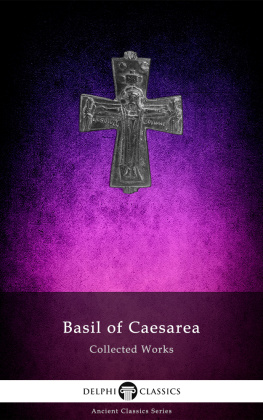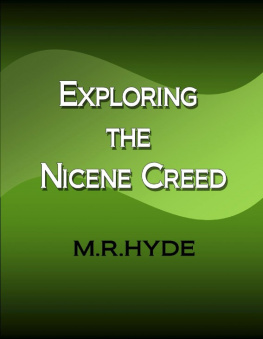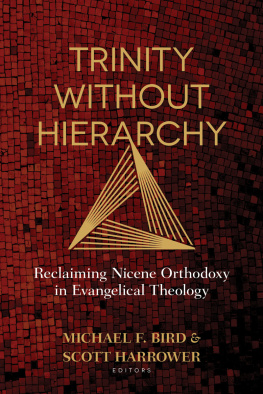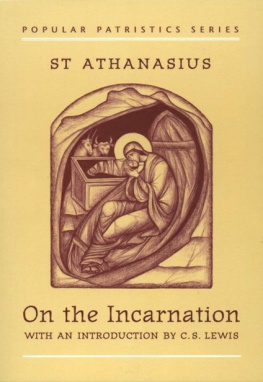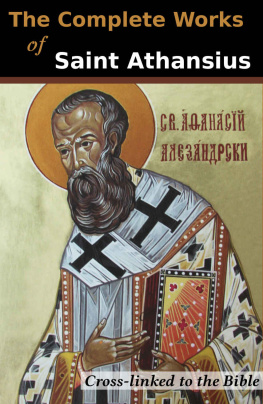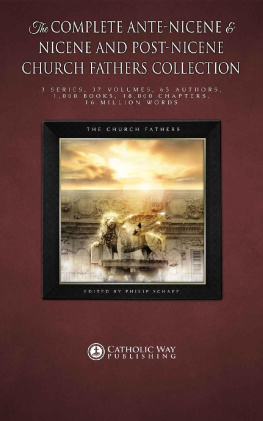A Defense of
The Nicene Definition
(De Decretis)
By
ST. ATHANASIUS
Translated by
BL. JOHN HENRY NEWMAN

2014
Copyright 2014 Assumption Press. While the original text contained here is in the public domain, the distinctive features and footnotes of this edition are retained under copyright, with all rights reserved.
Newmans translation of A Defense of the Nicene Definition was originally published in Select Treatises of St. Athanasius , by James Parker and Co. in1842. A revised edition was published Longmans, Green, and Co. in 1881. Th is edition follows the 1881 edition with some additional material from the 1842 version.
Cover image: Th e Council of Nicaea, Artist Unknown
Contents
Epistle of Athanasius
In Defence of the Nicene Definition
(De Decretis)
Prefatory Notice
W e have no means of determining the date of this Epistle, and critics do but offer conjectures at variance with each other. The Bollandists consider it to be earlier than A.D. 347, if not soon after the Nicene Council, e.g. 330 (Vit. Athan. c. 26). Montfaucon assigns some time between 350 and 354. Tillemont between 342 and 361.
Other aids towards determining it are such as these: it was written in a time of peace, after the experience and with the anticipation of persecution; but from 325 to 330 there was no such experience, from 330 to 347 no peace, and from 352 to 361 severe persecution; what interval is left for the date is from 348 to 352, which fulfils the requisite conditions, as being an interval of peace, with persecution before and after it.
It may be added that the rise of the Anomans was about A.D. 350, and about the same time Acacius became the leader of the Eusebian or court party on the tactic in controversy of confining definitions of doctrine to Scripture language, and thereby virtually of annihilating dogmatic faith. Now the main topic and the occasion of this Epistle, as Athanasius shows again and again, is the revival of Arianism proper in its original outspoken vigour, the prominence of Acacius, and the appeal to Scripture against orthodoxy by him and other successors of Eusebius.
Epistle of Athanasius. &c.
Chapter
Thou hast done well, in signifying to me the discussion thou hast had with the advocates of Arianism, among whom were certain of the party of Eusebius, as well as very many of the brethren who hold the doctrine of the Church. Very welcome to me was thy Christian vigilance, which excellently confuted the impiety of their heresy; while I marvelled at the effrontery which led them, after the exposures already made of their bad reasonings in the past, and of that perverse temper to which all men bore witness, still to be complaining like the Jews, Why did the bishops at Nica use terms not in Scripture, Of the substance and Consubstantial? Thou then, as a man of learning, in spite of their pretences, didst convict them of talking idly; and they in those pretences were but acting in accordance with their own evil disposition. For they are as variable and fickle in their sentiments, as chameleons in their colours; and when confuted they are confused; and when questioned they hesitate; and then they lose shame, and betake themselves to evasions. Lastly, when detected in these, they do not rest till they have invented fresh pleas which have no substance, and all this that they may persist in being loyal to an impiety.
Now such tactics are nothing else than an obvious token of their want of Divine Reason, and a copying, as I have said, of Jewish malignity. For the Jews too, when convicted by the Truth, and unable to confront it, made excuses, such as What miracles doest Thou, that we may see and believe Thee? What dost Thou work? from the truth.
As then the Jews of that day, for acting thus wickedly and denying the Lord, were with justice deprived of their laws and of the promise made to their fathers, so the Arians, judaizing now, are in my judgment in circumstances like those of Caiaphas and the contemporary Pharisees. For, perceiving that their heresy is utterly unreasonable, they start difficulties, saying, Why was this defined and not that? Yet wonder not though in the event they do not persevere in that sort of warfare; for in no long time they will have recourse to outrage, and will be throwing out threats of the band and the captain . Such is their inconsistency; yet how can it be otherwise with them? for, denying the Word of God, Divine Reason they have utterly forfeited. Aware then of this, I would of myself have made no reply to their attacks; but, since thy friendliness has asked to know what was done in the Council, I have not delayed to inform you, in order to show in few words how destitute Arianism is of a religious temper, and how its very business is to frame evasions.
Chapter
And do thou, beloved, consider whether it be not so. If, the devil having sown their hearts with this perverseness, they are so confident in the truth of their reasonings, why do they not first clear themselves of the charge of heresy which lies against them? and then will come the time for them to criticise the definition of the Council. For no one, on being convicted of murder or adultery, is at liberty after the trial to arraign the sentence of the judge, why he spoke in this way and not in that. For this, instead of exculpating the convict, rather increases his crime on the score of petulance and audacity. Why did not they find fault with the wording of the definition at the time when it was framed? but now when their first duty is to repeat after the Council those anathemas in which its creed ends, instead of this, they profess to have scruples as to the creed itself, and they find matter for a subterfuge in the fact, which no one denies, that the word substance is not in Scripture. Surely it is just that those who are under a charge should confine themselves to their own defence. While their own conscience is so unclean, they are not quite the men to quarrel with an act which in truth they do not understand. Rather, let them investigate the matter in a docile spirit, and, in order to learn what hitherto they had not known, let them cleanse their ears in the stream of truth and the doctrine of piety.
Now it happened to the Eusebians in the Nicene Council in this wise:On their making a stand in behalf of their impiety, the assembled bishops, who were more or less three hundred in number, mildly and courteously called upon them to explain and defend themselves. Scarcely, however, did they begin to speak, when they pronounced their own condemnation, for one differed from another; then, perceiving the serious straits in which their heresy lay, they remained dumb, and by their silence confessed the disgrace which came upon them. On this the Bishops, after condemning the formul which they had devised, published against them the sound and ecclesiastical faith; and, whereas all subscribed it, the Eusebians subscribed it too in those very phrases, of which they are now complaining, (I mean, Of the substance, and Consubstantial,) professing that the Son of God is neither creature nor work, nor in the number of things made from nothing, but that the Word is an Offspring from the substance of the Father. And, what is strange indeed, Eusebius of Csarea in Palestine, who had refused the day before, yet afterwards subscribed, and sent to his church a letter, saying that this was the Churchs faith and the tradition of the Fathers; and thereby made it clear to all that his party were in error before, and were rashly contending against the truth. For, though he was ashamed at the moment to adopt these phrases, and excused himself to his Church in his own way, yet he certainly means to signify his acceptance of them, in that he does not in his Epistle deny the One in substance, and Consubstantial. And in this way he got into a difficulty; for, in excusing himself, he thereby was attacking the Arians, as if their stating that the Son was not before His generation, was their denial of His existence even before His birth in the flesh. And Acacius too knows this well, though he also through fear may pretend otherwise because of the times, and may deny the fact. Accordingly I have subjoined at the end of these remarks the letter of Eusebius, that thou mayst know from it the scanty regard shown by Christs enemies towards their own masters, and singularly by Acacius himself.


